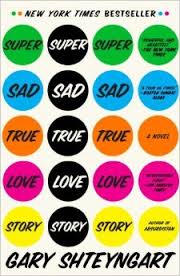In Super Sad True Love Story, Shteyngart subverts our traditional understanding of the “love story,” through his manipulation of social boundaries, ultimately blurring the line between individual’s public and private spheres. This adaptation of individual’s privacy, or lack there of, illustrates collective values in the novel, through what the individuals in society choose to reveal about them. The universality of societies reliance on technology and acceptance to divulge traditionally private information ultimately complicates conventional human psychology, blurring the lines between human and robot.
From the onset of the novel, both Shteyngart’s manipulation of the social boundaries, specifically the blurring of what is personal and private information, as well as his preoccupation with societies reliance on technology are evident through Leonard’s interaction with the American Restoration Authority. After promptly asking for Leonard’s name and social security number, the electronic Otter-shaped employee, declares, “You know Americans get lonely abroad…Tell me, for statistical purposes, did you have any intimate physical relationships with any non-Americans during your stay?” (9) This interaction highlights Shteyngart’s blurring of public and private boundaries through the juxtaposition of the questions regarding fundamental self-identity, a name; American identity, a social security number; and a conventionally private identity, a significant other. Immediately following this line of questioning Leonard learns that the United States government has flagged him. This possibly devastating result to Leonard’s seemingly innocent trip to a government agency raises questions regarding the blurring of private and public boundaries as well as technologies role in society as it appears that all Leonard’s problems could have been avoided with simple human interaction.
Shteyngart similarly illustrates the blurring of conventional public and private boundaries and its negative consequences through Leonard’s investigation into Eunice Park and her family. Leonard writes in his diary, “I beheld the numerical totality of the Park family and I wanted to save them from themselves, from the idiotic consumer culture that was bleeding them softly” (38). This is a revealing diary entry in that it highlights the traditionally private information that Leonard is able to glean regarding the Park’s via a simple search on his apparat. Furthermore, this entry illustrates societal values at work in the novel, through Shteyngart’s manipulation of the order in which information is revealed. Shteyngart’s concentration on the economic standing of the Park family not only render’s it vital information to the characters identity in society, but also vital information in Leonard’s attempts to “save” Eunice. The duality of this information, derived from human reliance on technology, is seen immediately following Leonard’s search into the Park’s as he writes: “Okay, stop. Enough detective work. Enough obsessiveness… Let’s see if I can write three pages without mentioning Eunice Park even once” (39). Leonard’s Meta awareness of his psychological dependence on technology is evident through his acknowledgement of being obsessive, and his attempt to avoid including Eunice in the story for three pages.
Shteyngart continues to illustrate human dependence on technology and the negative psychological effects of this dependence through the GlobalTeens discussion forum between Eunice and GrillBitch. Grillbitch writes, “You know you can verbal me anytime day or night. I feel like I don’t know what I’m doing half the time anyways, but I’m so glad that we can confide in each other, because the world sometimes feels so, like, I can’t even describe it. It’s like I’m floating around and the moment anyone gets near me or I get near anyone there’s just this STATIC” (46). Grillbitch’s difficulty expressing her feelings speaks to the negative effects of technology, as expressive language use seems to be a lost art. This notion is exaggerated by her decision to use the adjective “static” to describe her feelings toward human interaction. This is an interesting choice in that “static” is both representative of technological malfunction, but also literal stagnation. This derivation of “static” connects back to Leonard’s initial diary entry; he writes: “Don’t let them tell you life’s a journey. A journey is when you end up somewhere” (3). In this way, Shteyngart seems to suggest that technological advancement, and humans growing dependence on technology ultimately contributes to a static life, absent of real human interaction. However, Grillbitch’s declaration, “you can verbal me anytime day or night,” suggests a continued desire for verbal interaction as opposed to communication through technological filters. The mere existence of this sentiment in the technology-ridden world of Super Sad True Love Story suggests the possibility for an alternative, more personal future, with more conventional public and private spheres.

